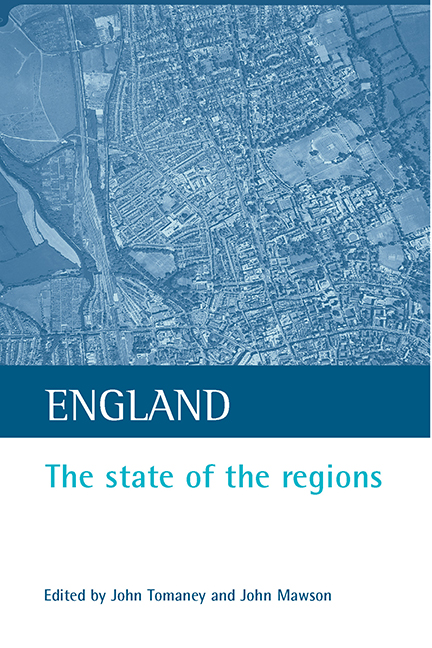Book contents
- Frontmatter
- Contents
- List of tables and figures
- Acknowledgements
- List of contributors
- one Introduction
- two Regional government in England: reviewing the evidence base
- three New Labour and the evolution of regionalism in England
- four Yorkshire (and the Humber)
- five Institutional collaboration in the West Midlands region
- six England's North West
- seven The South West
- eight Regionalism in the East of England
- nine The South East region?
- ten Regionalism in North East England
- eleven Regional strategy development in the East Midlands
- twelve The problem of regional governance
- thirteen Elected regional government: the issues
- fourteen Barnett plus needs: the regional spending challenge in Britain
- fifteen Conclusion: prospects for regionalism
- Index
- Also available from The Policy Press
five - Institutional collaboration in the West Midlands region
Published online by Cambridge University Press: 20 January 2022
- Frontmatter
- Contents
- List of tables and figures
- Acknowledgements
- List of contributors
- one Introduction
- two Regional government in England: reviewing the evidence base
- three New Labour and the evolution of regionalism in England
- four Yorkshire (and the Humber)
- five Institutional collaboration in the West Midlands region
- six England's North West
- seven The South West
- eight Regionalism in the East of England
- nine The South East region?
- ten Regionalism in North East England
- eleven Regional strategy development in the East Midlands
- twelve The problem of regional governance
- thirteen Elected regional government: the issues
- fourteen Barnett plus needs: the regional spending challenge in Britain
- fifteen Conclusion: prospects for regionalism
- Index
- Also available from The Policy Press
Summary
Introduction
Approaches to governance in each of the English regions during the postwar period have followed different trajectories, a consequence of historical, economic and geographical circumstances and shifts in institutional structures. In some, rivalry between local authorities constrained the emergence of a genuine commitment to regional working. In this respect the history of postwar collaboration between authorities in the West Midlands is distinct from many other English regions. Indeed, it is the only region, apart from the South East, that can claim a strong unbroken tradition of strategic planning associations since the 1960s, and which are regional rather than metropolitan or city-regional (Thomas, 1999).
A key explanation for this collaboration may lie in the region's geographical and administrative boundaries. The West Midland conurbation – Birmingham, the Black Country towns, Solihull and Coventry – dominates the region, and accommodates nearly half the region's population of over 5.3 million. The only comparable urban centre is on the northern edge of the region – around Stoke-on-Trent and Newcastle – with a population of some 0.3 million. The administrative boundaries of the metropolitan authorities are tightly drawn, separating the conurbation from the surrounding shire counties – Herefordshire, Shropshire, Staffordshire, Warwickshire and Worcestershire – rural areas with both country and new, expanding towns, many of which have gained rapid population from the dispersion of population from the metropolitan area.
Drewett's account of early postwar planning in the region showed how the conurbation and shire authorities were encouraged to collaborate by the need to find regionally based solutions to the population, housing and industrial growth of Birmingham (Hall et al, 1973). Given the economic downturn beginning in the mid-1970s, it might have been expected that the need for urban–rural cooperation would have become less urgent. However, there was a recognition among political leaders across the region that urban regeneration should be the key objective and that a failure to tackle the problems arising from economic and social decline in the conurbation would have serious implications for the wider region (Marshall and Mawson, 1987).
- Type
- Chapter
- Information
- EnglandThe State of the Regions, pp. 63 - 80Publisher: Bristol University PressPrint publication year: 2002



